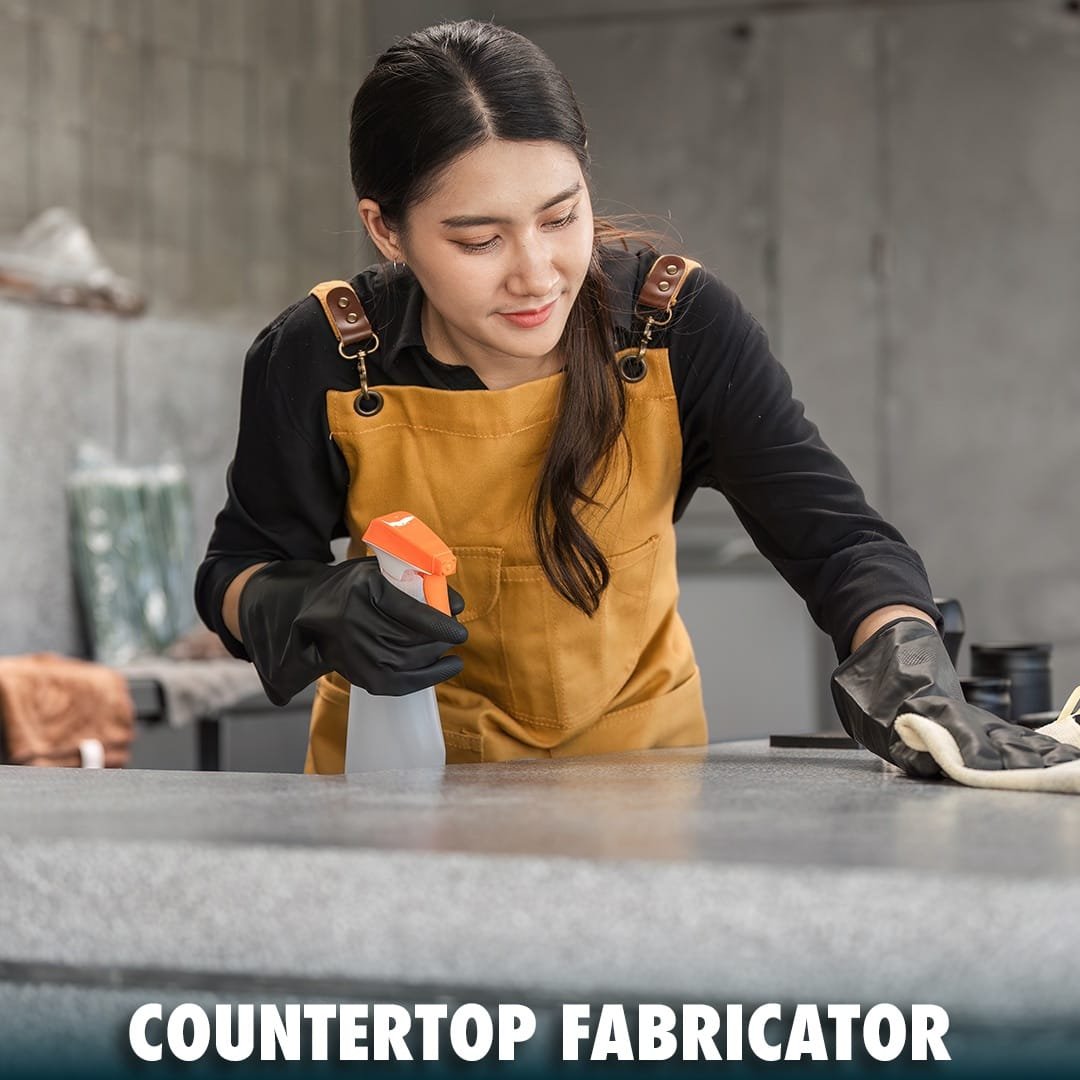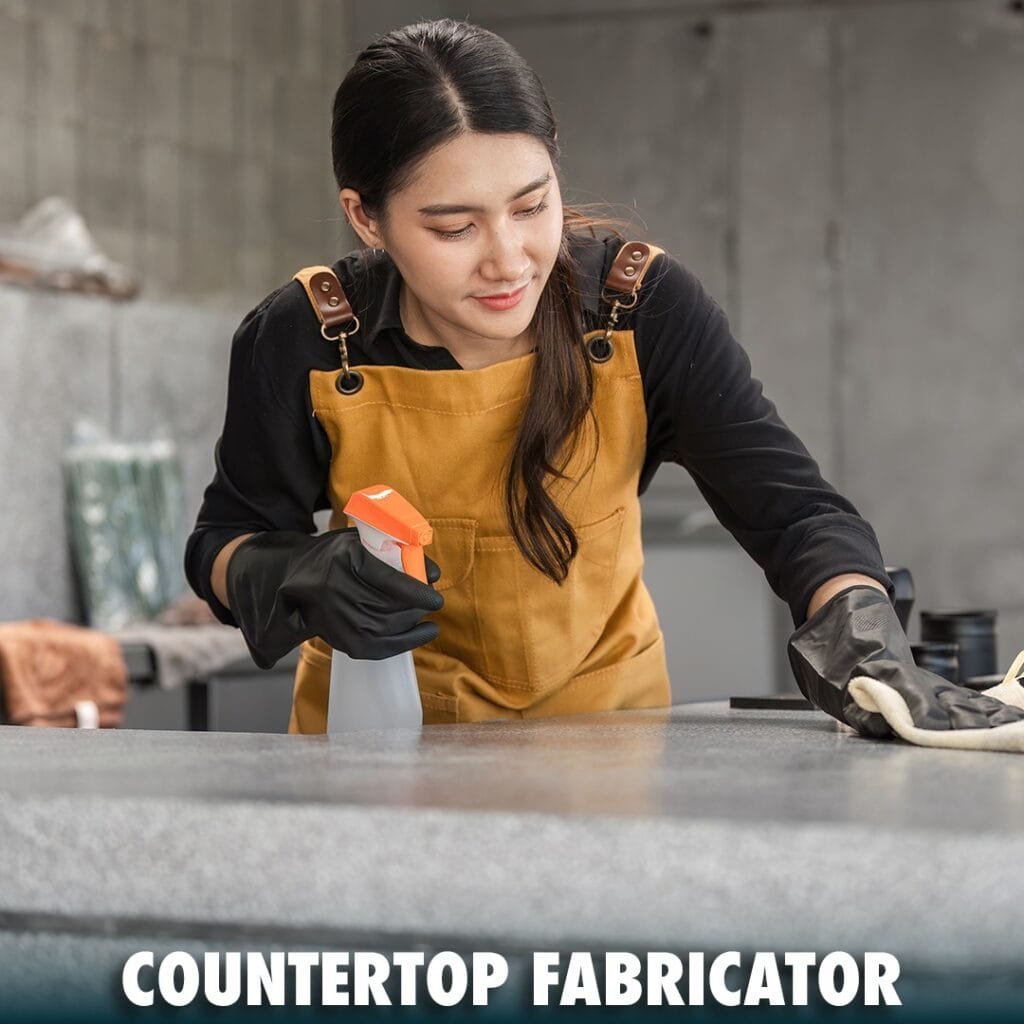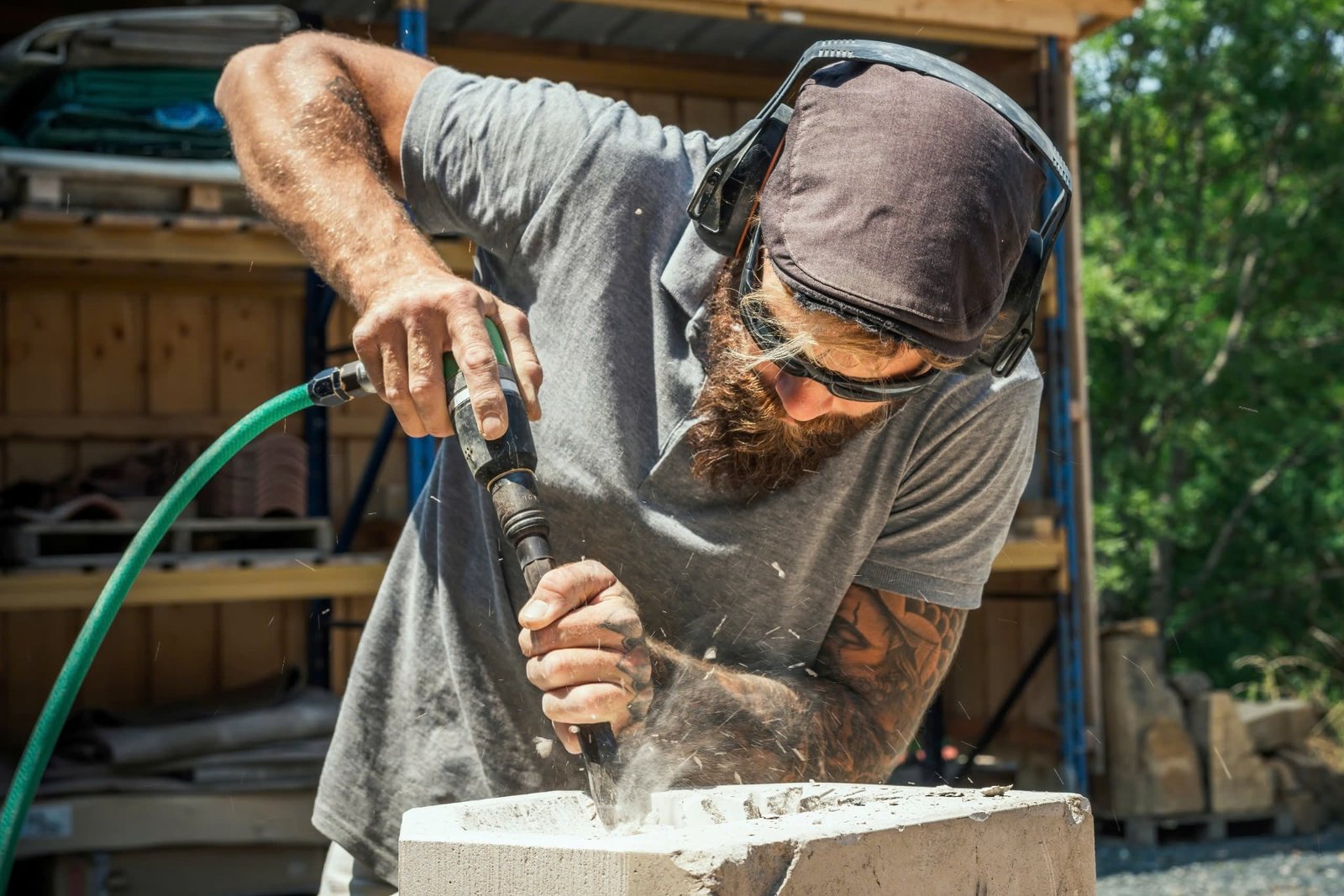
Countertop fabricators play a critical role in transforming raw natural stone into beautiful surfaces that adorn kitchens, bathrooms, and commercial spaces.
Countertop fabricators play a critical role in transforming raw natural stone into beautifully finished surfaces that adorn kitchens, bathrooms, and commercial spaces. At the heart of this transformation is the skilled work of a stone fabricator, a professional who specializes in cutting, shaping, and installing natural stone, particularly granite. In this comprehensive guide, we’ll delve into what a countertop fabricator does, the role of a stone fabricator in the industry, and the advanced techniques and tools they use—including the latest in material handling and automated equipment—to create stunning, durable countertops.

Introduction to Stone Fabrication
Stone fabrication is an art and science that involves converting large, raw slabs of natural stone granite into functional and aesthetically pleasing countertops and other surfaces. A countertop fabricator, often referred to as a granite fabricator when working with granite, must understand the unique properties of different stone types to produce high-quality finished products.
In today’s competitive market, it not only skilled in the manual aspects of stone cutting and polishing but also rely on advanced technologies to improve efficiency and precision. Whether you’re a homeowner planning a kitchen renovation or a business investing in new facilities, understanding the work of a stone fabricator can help you appreciate the craftsmanship behind every stone surface.
The Role of a Stone Fabricator in the Industry
What Does a Stone Fabricator Do?
A stone fabricator is responsible for the entire process of stone fabrication—from receiving and analyzing raw stone materials to cutting, shaping, and installing the finished product. This role involves several key tasks:
- Assessment and Planning: Evaluating the quality, color, and pattern of natural stone granite to determine the best layout and design for the countertop.
- Cutting and Shaping: Using specialized equipment to cut stone slabs to the exact dimensions required, and shaping them to accommodate sinks, cooktops, and other fixtures.
- Polishing and Finishing: Applying techniques to polish the stone surface, ensuring a smooth, high-gloss finish that enhances the natural beauty of the material.
- Installation: Carefully installing the finished countertop in residential or commercial settings, ensuring a precise fit and secure placement.
Countertop fabricators must be highly knowledgeable about various stone types, such as marble, quartz, and especially natural stone granite, as these materials require different handling and finishing techniques.
The Importance of Expertise
Skilled granite fabricators understand the nuances of each stone type. They work with materials that can vary widely in texture and durability. Their expertise ensures that the final product not only meets aesthetic standards but also withstands daily wear and tear.
For further insights into the nuances of stone work, check out our detailed guide on stone fabrication.
Understanding Stone Fabrication
The Process of Stone Fabrication
Stone fabrication is a multi-step process that requires precision, expertise, and state-of-the-art equipment. The process typically includes:
- Measuring and Template Making: Before any stone is cut, precise measurements of the installation area are taken. Templates are then created to ensure that the stone is cut to the exact specifications required.
- Rough Cutting: Using industrial saws and water jets, the fabricator performs a rough cut to remove excess material and prepare the stone slab for more detailed work.
- Precision Cutting and Shaping: CNC (Computer Numerical Control) machines often play a role in this stage, where intricate cuts are made, especially around cut-outs for sinks and other fixtures.
- Polishing: Using specialized abrasive tools, which not only enhance its natural beauty but also provide a protective finish.
- Edge Profiling: Shaped and rounded off according to the desired design, which can vary from simple square edges to more elaborate profiles.
- Final Inspection and Installation: Once the countertop is finished, it undergoes a thorough quality check before being installed.
Throughout this process, the precision of a countertop fabricator is crucial. The final product must seamlessly blend functionality with visual appeal.
The Role of Technology in Stone Fabrication
With highly modern stone fabrication, many fabricators utilize CNC machines, digital templating, and other computer-aided technologies to enhance precision and reduce waste. The engineers use automated water jets and diamond-tipped blades for making clean, accurate cuts in hard natural stone granite.
Advanced machinery also improves overall efficiency. A notable example is the use of a Vacuum lifter, which aids in the safe and efficient handling of heavy stone slabs. This designs help us to minimize the risk of damage during transport and ensures that large, unwieldy pieces
Tools and Technology in Stone Fabrication
Equipment Used by a Stone Fabricator
The tools and machinery that a stone fabricator uses are essential to producing high-quality countertops. Here are some of the most common tools:
- CNC Routers: For precision cutting and shaping of stone.
- Water Jets: Utilized for making clean cuts in granite and other hard stones.
- Polishing Machines: To achieve a high-gloss finish on the stone surface.
- Template Makers: Essential for creating accurate molds of the area where the countertop will be installed.
- Vacuum Lifter: Critical for safe material handling, ensuring that we can move heavy stone slabs without damage.
These tools not only increase the efficiency of the stone fabrication process but also ensure that every piece is handled with the utmost care.
The Role of Material Handling
Proper material handling is crucial in the stone fabrication industry. Heavy stone slabs can be dangerous if not moved correctly. Advanced material handling systems are integrated into fabrication workshops to ensure safety and efficiency.
The Role of a Countertop Fabricator in Enhancing Natural Stone Granite
Creating Functional Art
A countertop fabricator is more than just a technician—they are an artist. Each piece of natural stone granite is unique, and the fabricator’s job is to harness that uniqueness to create functional art. This involves understanding the stone’s natural patterns, colors, and veining, and then translating these characteristics into a design that enhances the overall aesthetic of a space.
Customization and Personalization
Many countertop fabricators offer customized solutions tailored to the specific needs of their clients. This may include bespoke edge profiles, integrated backsplashes, and cut-outs for sinks or appliances. Customized countertops are particularly popular in luxury residential and high-end commercial projects, where the emphasis is on creating a one-of-a-kind design.
Collaboration with Architects and Designers
The role of a countertop fabricator often involves close collaboration with architects, interior designers, and contractors. By working together, they ensure that the final product not only meets technical specifications but also complements the overall design of the space. This collaborative approach is essential in achieving a harmonious balance between functionality and aesthetics.
Challenges Faced by Stone Fabricators
Variability of Natural Materials
One of the biggest challenges faced by granite fabricators and other stone professionals is the natural variability of stone. Every slab of natural stone granite is unique, and factors such as color, pattern, and structural integrity can vary significantly even within the same quarry. This variability requires the fabricator to be highly adaptable and skilled in working with imperfect materials.
Precision in Measurement and Cutting
Accuracy is critical in stone fabrication. Even a slight error in measurement can result in significant issues during installation. Countertop fabricators must ensure that every cut and curve is executed with precision. This is where advanced technologies like CNC routers and digital templating become indispensable.
Safety and Material Handling
Working with heavy stone slabs poses significant safety challenges. Proper material handling is essential to prevent injuries and ensure that the stone is not damaged during the fabrication process. Rigorous safety protocols, combined with the use of advanced equipment such as the Vacuum lifter, help mitigate these risks.
The Future of Stone Fabrication
Advancements in Technology
The future of stone fabrication looks promising with ongoing advancements in technology. With automation, artificial intelligence, and improved material handling systems. These innovations will further enhance the precision, efficiency, and safety of stone fabrication processes.
Sustainability and Eco-Friendly Practices
As environmental concerns grow, the company increasingly produced stone fabrication on sustainable practices which includes minimizing waste through precision cutting, recycling stone offcuts, and using eco-friendly polishing and finishing materials. Sustainable practices not only reduce the environmental impact but also appeal to a growing market of eco-conscious consumers.
Continued Demand for Customization
Clients are looking for unique, personalized solutions, reflect their individual style and meet their specific needs. This trend is driving countertop fabricators to continually innovate and expand their range of services.
How to Choose the Right Stone Fabricator
Choosing the right stone fabricator is critical for achieving high-quality, durable, and aesthetically pleasing countertops. Here are some factors to consider when selecting a professional for your project:
Experience and Expertise
Look for a fabricator with extensive experience in working with natural stone granite. An experienced granite fabricator or countertop fabricator will have the skills and knowledge necessary to handle the complexities of stone fabrication.
Portfolio and References
Review the fabricator’s portfolio to assess the quality of their work. Positive customer testimonials and references can provide insight into their reliability and craftsmanship. A reputable stone fabricator will be happy to share examples of past projects.
Technology and Equipment
Ensure that the fabricator utilizes modern equipment and technology. Advanced tools such as CNC routers, digital templating systems, and efficient Vacuum lifters are indicators of a professional, state-of-the-art operation.
Customer Service and Collaboration
A good fabricator values collaboration. They should work closely with you, your designer, and your contractor to ensure that the final product meets your expectations. Clear communication and excellent customer service are essential for a successful project.
For a detailed look into the process and timeline involved, check out this insightful article by a stone fabricator.
Conclusion
A countertop fabricator, or stone fabricator, is an expert in transforming raw, natural stone granite into exquisite, functional countertops that enhance the beauty and value of any space. Their role encompasses a wide range of skills—from precise measurement and cutting to advanced finishing techniques and safe material handling. Utilizing cutting-edge technology and innovative methods, these professionals ensure that each countertop is a unique work of art that meets both aesthetic and functional demands.
Whether you are considering a project that involves a granite fabricator or a general countertop fabricator, it is essential to understand the intricate process behind stone fabrication. From the initial assessment and cutting to the final installation, every step is crucial in creating a durable and stunning finished product.
With advancements in technology, such as automated CNC systems and modern Vacuum lifters, become even more efficient and sustainable. As the demand for custom, high-quality stone surfaces grows, the expertise of countertop fabricators will continue to be in high demand.
For more information on the art and science of stone fabrication, visit our comprehensive guide on stone fabrication and learn how advanced techniques and quality material handling are transforming the industry.
In summary, a countertop fabricator does much more than simply cut and polish stone. They are artists and engineers who combine technical precision with creative design to produce surfaces that are both beautiful and enduring. By choosing a skilled stone fabricator, you ensure that your investment in natural stone granite results in a stunning, long-lasting countertop that elevates your space.
Embrace the expertise of professional stone fabricators and experience the difference that quality craftsmanship and innovative technology can make in your next project.

